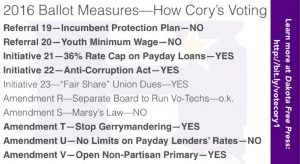
While I was out campaigning over the weekend, one of my Aberdeen neighbors recognized me and said, “I’m not voting for you, Cory, but tell me about those ballot measures.”
The serious, practical canvasser thinks, no vote to win here, says, “Sorry, gotta go!” and keeps on trucking to the next five doors where there may be electoral apples to pick.
I stay, whip out my card, and we go at it.
We find agreement on five or six of the ballot measures, but my neighbor resists my logic on Amendments T and V. He doesn’t think we can stop gerrymandering, and he just doesn’t like the open non-partisan primary. But his ultimate (literally, ultimate, as in final, as in the thing he says to close our discussion) concern is regulation: he doesn’t like a bunch of regulation, so he’s going to vote NO on T and V.
But my neighbor will vote for Initiated Measure 21, the real 36% rate cap on payday lending.
And my neighbor tells me we ought to have better campaign finance laws that would stop Hillary Clinton from getting all that nasty superPAC money. I don’t hyperlink and blockquote in door-to-door conversations, but…
Though Democratic presidential candidate Hillary Clinton is boosted by Priorities USA Action, a super PAC that has raised more than $133 million, she backs a constitutional amendment to overturn the Citizens United decision. Clinton has also endorsed a series of reforms, including disclosure policies that could be enacted by executive action or legislation, and bills to create a system to fund congressional elections with public dollars.
Trump repeatedly criticized the role of money in politics throughout the primary election, and more recently in his campaign against Clinton. He is backed by an array of super PACs funded by billionaires, including Adelson and hedge funder Robert Mercer. Trump has not proposed any campaign-finance reform policies. Instead, the Republican Party platform calls for the end to campaign contribution limits and most existing reform policies [Paul Blumenthal, “Super PAC Megadonors Are Giving More Than Ever in 2016,” Huffington Post, 2016.10.10].
If you want more campaign finance regulation, you stand a better chance of getting it from Clinton and the Democrats than from Trump or the Republicans (I feel the need to switch conjunctions to reflect the growing Trump/GOP disjunction). You also vote for Initiated Measure 22, which may not affect Presidential politics but will certainly offer more transparency for money in state politics.
But if you don’t like regulation, you can’t call for the very serious and expansive regulation of how real people and fake corporate persons everywhere spend their money on political speech or support a rate cap that (we openly hope!) will put some loan sharks out of business. At the same time, you can’t invoke anti-regulatoryism to oppose two amendments that (a) limit government action, not private activities and (b) promise voters more opportunity to vote in competitive elections.
I don’t ride my neighbor hard—he’s got work to do, and I’ve got doors to knock. But understand, folks: it’s perfectly reasonable and respectful to ask for consistency in one’s principles. There are many valid reasons to oppose Hillary Clinton and the influence of big money in politics, just as there are logical reasons to vote no on Amendment V (I’m having a harder time being as generous to the straw-grasping and deceptive opponents of Amendment T). Calling for more regulation to rein in Hillary Clinton’s superPACs but branding state ballot measures to draw fairer election maps and open the primaries as “too much regulation” doesn’t make sense.
Please explain the rationale for Amendment V. I’m an Indie voter–Dem until the 2010 mid-term, when the national party wimped out on economic issues–and can vote in the Dem primary in SD. I have no interest in voting for R’s. (The only time I did so was back in the 80’s, when I registered R to vote against Janklow in the primary.)
Hi, Michael! Here’s my rationale: I want more people to have more opportunities to vote. You may have no interest in voting for Rs, but that could change. You might also find yourself stuck in a situation where the only people running are Republicans. Instead of boxing you out or requiring your to re-register R (and thus lose your chance in that primary to vote for a couple of Democrats in a tight partisan primary race), V lets you come to the polls and have your say… thus forcing those Republican candidates to appeal to more voters than the rabid GOP core who otherwise push primary candidates hard right.
Furthermore, I like the fact that V ensures every general election is a runoff between two candidates, one of whom will win by a majority vote.
Now, for you as an indy, V may appear to harm the chances of indy candidates appearing on the general election ballot, since they are no longer guaranteed a spot on the November ballot. But V
may actually improve indies’ chances of winning: instead of having to win the general, all or nothing, against two major-party nominees who will hog the media attention, indies under V simply need to place second in the primary, which will win them the opportunity to go one-on-one with a lone major-party candidate. If I were an Indy, I’d like those chances better than what the current system offers.
V also calls for equal petition requirements for indies, meaning they won’t have to gather more signatures than Republicans and Democrats, as is the case now. That’s a small improvement, but for indies, every bit counts.